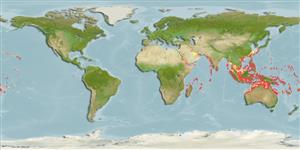Common names from other countries
Environment: milieu / climate zone / depth range / distribution range
Ökologie
seewasser riff-verbunden; tiefenbereich 0 - 75 m (Ref. 6773), usually ? - 16 m (Ref. 90102). Tropical; 32°N - 36°S, 29°E - 147°W (Ref. 57375)
Indo-Pacific: Red Sea and East Africa to the Hawaiian and Society islands.
Size / Gewicht / Alter
Maturity: Lm ? range ? - ? cm
Max length : 30.0 cm TL Männchen/unbestimmt; (Ref. 559)
Rückenflossenstacheln (insgesamt) : 3; Rückenflossenweichstrahlen (insgesamt) : 12 - 13; Afterflossenstacheln: 0; Afterflossenweichstrahlen: 7 - 8. Color variable; has a black phase with white pectoral ray tips. Bony part of illicium with numerous dark crossbands and nearly twice as long as the 2nd dorsal spine; esca an elongate tuft of flattened appendage.
Inhabit shallow sheltered reefs (Ref. 9710). Adults usually with sponges; juveniles openly on sand or reef, mimicking small sponges or nudibranchs (Ref. 48635). Benthic (Ref. 58302). Oviparous. Eggs are bound in ribbon-like sheath or mass of gelatinous mucus called 'egg raft' or 'veil' (Ref. 6773).
Life cycle and mating behavior
Maturities | Fortpflanzung | Spawnings | Egg(s) | Fecundities | Larven
Oviparous. Eggs are bound in ribbon-like sheath or mass of gelatinous mucus called 'egg raft' or 'veil' (Ref. 6773).
Pietsch, T.W. and D.B. Grobecker, 1987. Frogfishes of the world. Systematics, zoogeography, and behavioral ecology. Stanford University Press, Stanford, California. 420 p. (Ref. 6773)
IUCN Rote Liste Status (Ref. 130435)
CITES (Ref. 128078)
Not Evaluated
Bedrohung für Menschen
Harmless
Nutzung durch Menschen
Fischereien: nicht kommerziell
Tools
Zusatzinformationen
Download XML
Internet Quellen
Estimates based on models
Preferred temperature (Ref.
115969): 25.1 - 29.3, mean 28.3 (based on 3097 cells).
Phylogenetic diversity index (Ref.
82804): PD
50 = 0.5005 [Uniqueness, from 0.5 = low to 2.0 = high].
Bayesian length-weight: a=0.01995 (0.00906 - 0.04395), b=3.01 (2.83 - 3.19), in cm Total Length, based on all LWR estimates for this body shape (Ref.
93245).
Trophic level (Ref.
69278): 4.4 ±0.8 se; based on size and trophs of closest relatives
Widerstandsfähigkeit (Ref.
120179): hoch, Verdopplung der Population dauert weniger als 15 Monate. (Fec assumed to be > 10,000).
Fishing Vulnerability (Ref.
59153): Low vulnerability (20 of 100).
